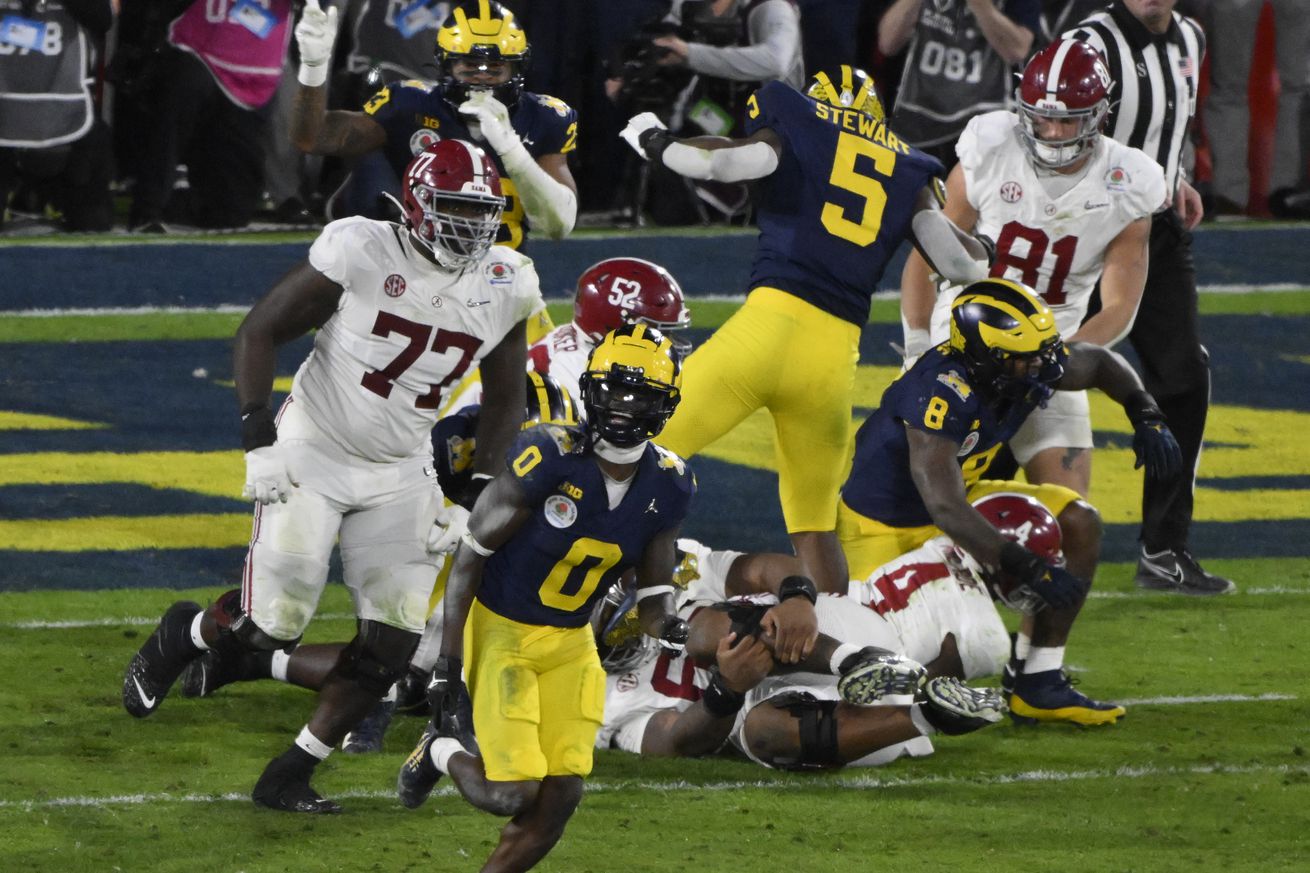Robert Hanashiro-USA TODAY Sports
Alabama’s biggest issue against Michigan showed up again on the game’s most important play in the College Football Playoff.
For most of the second half, this looked like your traditional Alabama game.
Michigan should’ve gone for the head when they were up 13-7 in the semifinals of the College Football Playoff. They had made too many mistakes, and they let ‘Bama back in the game.
Despite all of the good play that the Crimson Tide displayed after their loss to Texas, one mantra that stuck with this specific Alabama team this year were the struggles on the offensive line, and on the last play of the game, it ended the Crimson Tide’s season. For most of the second half, Alabama’s offensive line regained control by condensing their game. Lots of Pony personnel (two backs in the game), a lot more of fullback/TE Robbie Ouzts on the field, and more duo and gap scheme running. With the Alabama offensive line being bigger and more fit to phone booth battles, the Tide took control of the second half, at one point taking the lead.
However, in overtime, with their season and a national championship on the line, the offensive line’s issues reared their ugly head once again. Let’s set the scene. It’s fourth and goal from the Michigan three-yard line. After a series of timeouts basically playing chess with each other, Alabama sends out 11 personnel and trips with the tight end on the line of scrimmage, a different look from what they were successful with in the second half. From there, they send RB Roydell Williams into motion, and where the unraveling begins.
” It’s Williams in motion. Low snap. MILROE STOPPED. MICHIGAN MAKES A STAND AND COMES UP WITH A MILESTONE PLAYOFF VICTORY.”
Chris Fowler on the call for the Final play of the Rose Bowl.
Michigan beats Alabama 27-20 in overtime. pic.twitter.com/NFjkAGZKiT
— Awful Announcing (@awfulannouncing) January 2, 2024
So first off, allow me to say this: at first I thought the playcall was a poor one. However, going back and watching the play, I think the call itself was fine. It’s an RPO with a swing to the back attached to QB Power. If QB Jalen Milroe doesn’t think he has the box count to run it, he has the number advantage on the swing pass. Michigan had beaten Alabama a lot with their blitzes and sending pressure all game, so this was an easy way to force their hand. However, the execution up front doomed the play from the jump.
Let’s start with the snap. Alabama’s center struggled with the snap all season, but on Monday it really got ugly. Milroe was thrown off by snaps that were never on target, and it put the passing game out of whack as well. A low snap here forces Milroe to completely abort this RPO and try and take the ball in himself. A good snap probably gives Milroe a better shot at reading out the RPO.
The other thing that throws off this play is Alabama being beat up front. If you watch from the end zone view, right tackle JC Latham is beat on the scoop block, being pushed into Milroe and effectively tripping him, slowing up his momentum after an already bad snap. Michigan did a lot of slanting of their front to take advantage of their quickness and on the left side of the line, the EDGE slants across the TE’s face to muddy the look. However, this play probably scores with a good snap. Milroe follows the puller and he gets in the end zone.
Bad snap on the final play doomed the timing of the run. It was there if Milroe had a good snap and could hit the run where it was intended. Would have been tough but there’s a path with the widest guy going so far upfield. pic.twitter.com/khi61nHDV1
— Geoff Schwartz (@geoffschwartz) January 2, 2024
The interesting thing here is the widest guy on the field. Michigan sees the fast motion and instead of peeling off that end man on the line of scrimmage, they send him wide up the field so he can disrupt the potential swing pass. As you can see, the Tide have the advantage on the outside. Would it have been a more difficult throw? Probably, but one that with the RPO could’ve been made.
But this play was dead from the jump, because of problems that plagued the Tide all year.













